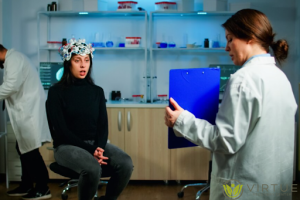Key Takeaways:
- Artists who are getting over an LSD addiction often need help with substance use disorder, acute psychosis, and erratic behaviors through a combination of mental health and psychological support.
- The Virtue Recovery Center in Houston demonstrates how a combination of therapy, detox, and a supportive environment can help individuals maintain sobriety.
- Classical psychedelics, like LSD, provide subjective effects of LSD and LSD-induced altered states of consciousness; however, their psychological mechanisms are insufficiently regulated and present considerable hazards.
- Two practical approaches to support recovery are Acceptance and Commitment Therapy and Relapse Prevention Therapy.
- Artists may move out of chaos and into recovery with a structured program like the Drug Detox Program or The 5 Stages of Addiction Recovery From Substance Use.
Introduction
Starting addiction recovery from an LSD addiction is hard, especially for artists who typically look for ways to be more creative, yet risk losing their minds and getting into trouble. The sudden and intense acute psychedelic effects, which might include vivid hallucinations, severe anxiety, or dissociation, may seem exciting at first, but they can swiftly turn into a terrible collapse. This means that it is vitally crucial to receive help for substance use in a safe place that is made to help creative people get their lives back on track. Individualized treatments at the Virtue Recovery center in Houston focus on the subjective effects of LSD and the LSD-induced altered states of consciousness that come with it, as well as the substance use disorder that causes people to misuse it over and over again. These kinds of programs teach artists how to deal with creative drives without compromising their mental health conditions. This makes it less likely that they will give in to the urge to escape in a big way.What Are The Risks Of LSD For Artists, And Why Is It Vital To Get Better?
Artists could be intrigued by LSD because it promises to help them think more creatively, yet classic psychedelic experiences are exceedingly risky. MedlinePlus adds that LSD affects the serotonin system, which can have a substantial effect on mood, perception, and thought. Even small amounts can make you see things that aren’t there. These potent effects of psychedelic substances can make people feel scared, panicked, or paranoid. They can also cause long-lasting psychotic breaks in persons who are already mentally unstable. There is increased interest in the potential of psychedelics. Nevertheless, both historical and Harvard Health recent assessments caution that contemporary clinical standards are inadequate and the efficacy of psychedelic treatment remains uncertain, particularly for recreational use. For artists who are engaged in a cycle of substance use, mental health problems, and creative instability, recovery is not an option; it is required to maintain their health and their artistic integrity.How Does A Structured Program Help Individuals Who Want To Stop Using LSD?
 The key to successful addiction recovery is having a plan with steps, like the 5 Stages of Addiction Recovery From Substance Use.
It helps patients get from denial to maintenance and finally to staying clean. At first, a Drug Detox Program makes sure that the body is stable while keeping an eye out for any psychiatric symptoms that may come back.
One of the following steps is to get Relapse Prevention Therapy. It teaches people how to deal with things that make them want to use drugs, like wanting a high dose of LSD, and it helps them stay sober for a long time. At the same time, therapies like acceptance and commitment therapy help people discover meaning in their lives and creative ways to express themselves without using drugs.
These steps, together with a supportive environment like the Virtue Recovery Center in Houston, help artists shift how they think about drugs, creativity, and mental health.
The key to successful addiction recovery is having a plan with steps, like the 5 Stages of Addiction Recovery From Substance Use.
It helps patients get from denial to maintenance and finally to staying clean. At first, a Drug Detox Program makes sure that the body is stable while keeping an eye out for any psychiatric symptoms that may come back.
One of the following steps is to get Relapse Prevention Therapy. It teaches people how to deal with things that make them want to use drugs, like wanting a high dose of LSD, and it helps them stay sober for a long time. At the same time, therapies like acceptance and commitment therapy help people discover meaning in their lives and creative ways to express themselves without using drugs.
These steps, together with a supportive environment like the Virtue Recovery Center in Houston, help artists shift how they think about drugs, creativity, and mental health.
What Do We Know About LSD’s Psychological Mechanisms And Therapeutic Claims?
 LSD is still a classic psychedelic that can change the way people think. Some people call this a “reset,” and it can help your brain be more flexible. Neuroscience research from institutions such as the Medical College of Wisconsin demonstrates that the mechanisms of psychedelics may induce neuroplastic alterations by stimulating serotonin receptors.
However, most of this information comes from controlled study settings, mostly historical studies on alcoholism and a few modern trials. It can’t be applied to uncontrolled use. There is some evidence that the therapeutic effects of psilocybin and psychedelic therapy might work, but it’s not strong enough to be called confirmed. We need to do more research on how psychedelics aid people with addiction. This illustrates that both artists and patients need to be careful. Psychedelics can be very useful, but utilizing them without any rules might be dangerous and lead to chaos instead of creative ideas.
LSD is still a classic psychedelic that can change the way people think. Some people call this a “reset,” and it can help your brain be more flexible. Neuroscience research from institutions such as the Medical College of Wisconsin demonstrates that the mechanisms of psychedelics may induce neuroplastic alterations by stimulating serotonin receptors.
However, most of this information comes from controlled study settings, mostly historical studies on alcoholism and a few modern trials. It can’t be applied to uncontrolled use. There is some evidence that the therapeutic effects of psilocybin and psychedelic therapy might work, but it’s not strong enough to be called confirmed. We need to do more research on how psychedelics aid people with addiction. This illustrates that both artists and patients need to be careful. Psychedelics can be very useful, but utilizing them without any rules might be dangerous and lead to chaos instead of creative ideas.
Conclusion
Detox isn’t enough to get over the symptoms of LSD addiction and break free from the cycle of madness and turmoil. It needs a detailed, step-by-step approach for artists to help them get over their addiction. Psychedelics could be very useful, but only a thorough investigation will determine if artists can utilize them safely in the future. Until then, recovery needs help, structure, and care. Do something today that will help you heal in a safe and lasting way. Virtue Recovery Houston is here to support you every step of the journey. Call us right away at Tel: 713.234.6254.How Can Understanding the Difference Between Craving and Wanting Help Artists in Their LSD Addiction Recovery?
Artists navigating LSD addiction can benefit greatly from understanding craving versus wanting in addiction. By distinguishing between these two feelings, they can recognize genuine needs versus transient desires. This insight empowers them to make healthier choices, focusing on their creative passions without succumbing to the powerful pull of substance cravings.
FAQs:
What should you do initially to stop being addicted to LSD?
To properly deal with withdrawal and enhance mental health, you need to start a Drug Detox Program at a medically supervised facility.How can Acceptance and Commitment Therapy help people feel better?
It helps people deal with complex emotions, stay true to their principles, and minimise their chances of relapsing. This is particularly beneficial for creative individuals with strong desires.How can family and friends aid someone without letting them take drugs?
By making the home a supportive environment, getting help from professionals, setting limits, and understanding mental health conditions and addiction issues.What makes the Virtue Rehabilitation Center in Houston distinct for artists who are recovering?
It helps artists get away from the turmoil that LSD generates by using mental health understanding, stage-based recovery (such as Relapse Prevention Therapy and the five-stage model), and support that is responsive to their creative needs.Citations
- U.S. Department of Health and Human Services, MedlinePlus. “Substance use – LSD.” MedlinePlus. https://medlineplus.gov/ency/patientinstructions/000795.htm.
- Harvard Health Publishing, Harvard Medical School. “Back to the future: Psychedelic drugs in psychiatry.” Harvard Health. https://www.health.harvard.edu/blog/back-to-the-future-psychedelic-drugs-in-psychiatry-202106222508.
- Medical College of Wisconsin. “The Life-Changing Potential of Medical Psychedelics.” MCW Knowledge. https://www.mcw.edu/mcwknowledge/mcw-stories/the-life-changing-potential-of-medical-psychedelics.








